+ BRINE SDS
+ CALCIUM CHLORIDE WITH BOOST SDS
+ BOOST SB SDS
+ LIQUIDOW SDS
+ MELTDOWN SDS
GOOD FOR DUST, THE RESIDENTS, & THE ROAD
Using calcium chloride for dust control not only keeps the roads and parking lots clear of dust, but it also makes the residents on gravel roads happy. On top of that, calcium chloride applications are good for the health of the road in winter and summer and can begin to work year over year.
WHAT YOU’RE UP AGAINST
Gravel roads and parking lots kick up dust. You know it. The residents know it. Summers in the midwest can be unpredictable, and dry spells can cause dust from gravel roads to become unmanageable.

WHEN YOU HAVE NO DUST CONTROL GAMEPLAN
When dust gets out of control, residents become frustrated. It’s understandable. People who live along gravel roads deal with the nuisance of dust, and it can even exacerbate existing health problems.

WHAT YOU’RE UP AGAINST
Gravel roads and parking lots kick up dust. You know it. The residents know it. Summers in the midwest can be unpredictable, and dry spells can cause dust from gravel roads to become unmanageable.
WHEN YOU HAVE NO DUST CONTROL GAMEPLAN
When dust gets out of control, residents become frustrated. It’s understandable. People who live along gravel roads deal with the nuisance of dust, and it can even exacerbate existing health problems.
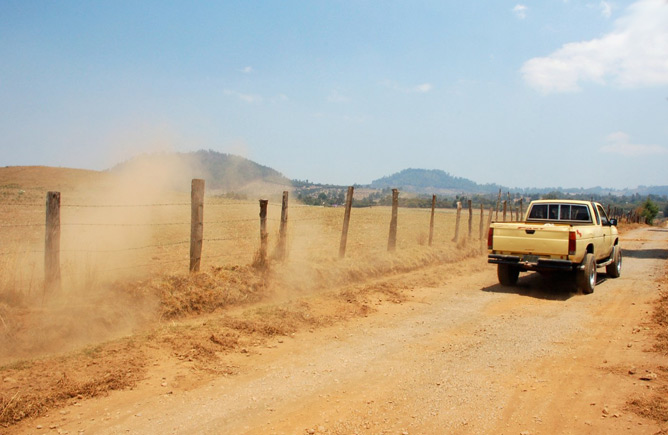
WHAT YOU’RE UP AGAINST
Gravel roads and driveways kick up dust. You know it. The residents know it. Summers in the midwest can be unpredictable, and dry spells can cause dust from gravel roads to become unmanageable.
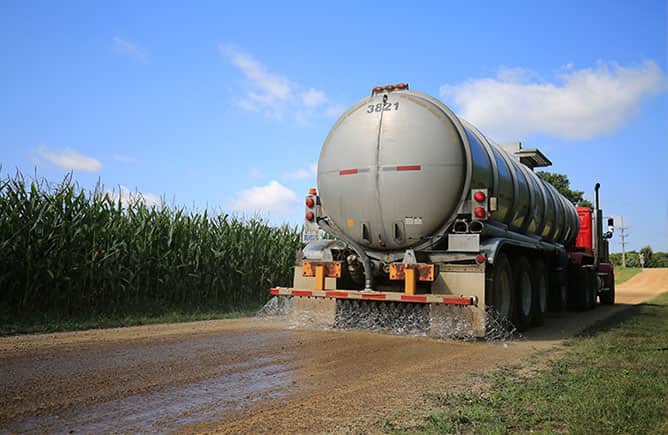
WHEN YOU HAVE NO DUST CONTROL GAMEPLAN
When dust gets out of control, residents become frustrated. It’s understandable. People who live along gravel roads deal with the nuisance of dust, and it can even exacerbate existing health problems.

THE HIDDEN COSTS OF LEAVING ROADS UNTREATED
Not using calcium chloride on unpaved roads and parking lots may be costing you much more than you realize.
With no calcium chloride treatments, field studies have indicated that unpaved roads will need to be regraveled 7-14 years sooner than unpaved roads not treated with calcium chloride.
Occidental Chemical Corporation
Nearly 34% of particulate matter in the USA's atmosphere originates from unpaved roads. This dust leads to pollution, health problems, and a general nuisance for residents who live along gravel roads.
University Of Colorado
Field trial results show that not using calcium chloride to treat unpaved roads increases blading frequency by 50%, increasing the time and resources spent on unpaved road maintenance.
Occidental Chemical Corporation
YOU CAN SAVE TIME & MONEY
With a proactive dust control solution, you save resources and time in the first year alone. Additionally, your treatments will become more and more effective year over year, saving you more time and money the more consecutive years you apply calcium chloride treatments.
Tests have proven that calcium chloride outperforms other dust control solutions by as much as 38%.
Calcium chloride treatments reduce cost of unpaved road maintenance by 30% or more.
Liquid calcium chloride has a long, 100 year proven track record of effective dust control.
Source: Occidental Chemical Corporation
Our Process Is Easy
When you work with Great Lakes Chloride, you’ll be amazed at how easy managing dust can be. Our team is here to answer your questions and help you find and implement the perfect dust control solution.
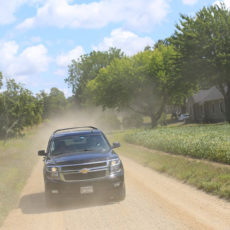
1. Plan Ahead
The time to start thinking about dust control is early in the season, before dust control becomes a difficult problem to manage. Talk with one of our team members to put a strong dust control strategy in place. This way, we can be sure your area is on the schedule before the dust becomes a major nuisance.
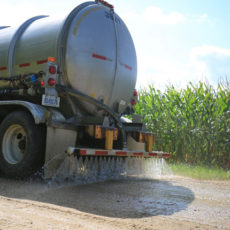
2. Treatment
Once we’ve had a chance to understand your needs a little better, we will send a team member out with a truck to start spraying your roads. Remember, we can only apply effectively when the weather conditions are right in order for treatments to be effective, so we will want to take some time to get the job done right.

3. Use Us As A Resource
While you can expect to see a significant decrease in dust, success of the calcium chloride treatments may be diminished if your road is in extremely poor condition. No matter what the case may be, we will come out to evaluate your roads and make sure we help you find the best solution. Our team is here for you when you need us.

4. Enjoy The Fresh Air
Once your roads have been treated, you can kick back and breathe a sigh of relief. You can also rest assured knowing that your treatments will become more effective with each passing year, and even offer the added bonus of stabilizing your road and continuing to absorb some moisture in winter weather.

DUST CONTROL FAQ
Great Lakes Chloride helps counties across the midwest manage dust. Over our many years of helping with dust control, we’ve answered a lot of questions. Here are a few questions we hear that you may find helpful.
HOW DOES CALCIUM CHLORIDE WORK FOR DUST CONTROL?
Calcium chloride is hygroscopic, which means it attracts moisture from the air and surroundings. Therefore, calcium chloride assists in keeping surfaces damp and dust down. Calcium chloride also resists evaporation, which means a single application will last a long time.
WHAT TIME OF YEAR WILL YOU APPLY THE LIQUID CALCIUM CHLORIDE?
You’ll want to talk to a team member early in the year. Our team treats by area, and we also have to make sure the weather is optimal to maximize the effectiveness of your treatment. The sooner you reach out to us to add your name to the list, the better!
WHO PAYS FOR DUST CONTROL TREATMENTS?
Different counties handle treatments in different ways. Some counties fund treatments on their own, others rely on the residents to handle dust control treatments. Still other counties will help residents who are interested in dust control treatments by paying a portion of the cost.
DOES CALCIUM CHLORIDE GET WASHED AWAY IN THE RAIN?
A completed calcium chloride treatment won’t wash away in the rain. Once your liquid calcium chloride treatment has had a chance to dry, it will be effective throughout the course of the season. For most gravel roads that aren’t in poor condition, you shouldn’t need another application until the following year.
HOW SAFE IS CALCIUM CHLORIDE FOR DUST CONTROL TREATMENT?
Very. Calcium chloride is actually found in many foods that you consume on a daily basis. Liquid calcium chloride is one of the safer options for dust control.
DOES CALCIUM CHLORIDE CAUSE VEHICLE DAMAGE OR CORROSION?
No, calcium chloride does not cause noticeable corrosion or damage to vehicles. Once a treatment is dry, the calcium tends to stay down in the dirt, so there is little chance for significant contact with your vehicle. Still not feeling sure? Just take a look at our treatment trucks… our vehicles are exposed to high levels of calcium chloride every day, but you won’t notice corrosion from calcium chloride on our trucks.

Randy Knach
– Allen County Highway Supervisor
“If your County Highway Department wants to suppress the dust and create a stable road base, in my opinion, LIQUIDOW™ Calcium Chloride is the product to use. We have been using this product with success for over 10 years. It is also our product of choice to aid in fighting snow and ice. We use Calcium Chloride for dust control on our gravel roads, where we can maintain roads with underbody blades or graders, and the calcium is still present. We use calcium chloride when we reclaim existing chip and seal roads, to stabilize the base. During the winter months we apply calcium chloride at the spinner to enhance the melting process of our salt on snow and ice.”
ARE YOU READY TO TAKE CONTROL OF YOUR DUST PROBLEM?
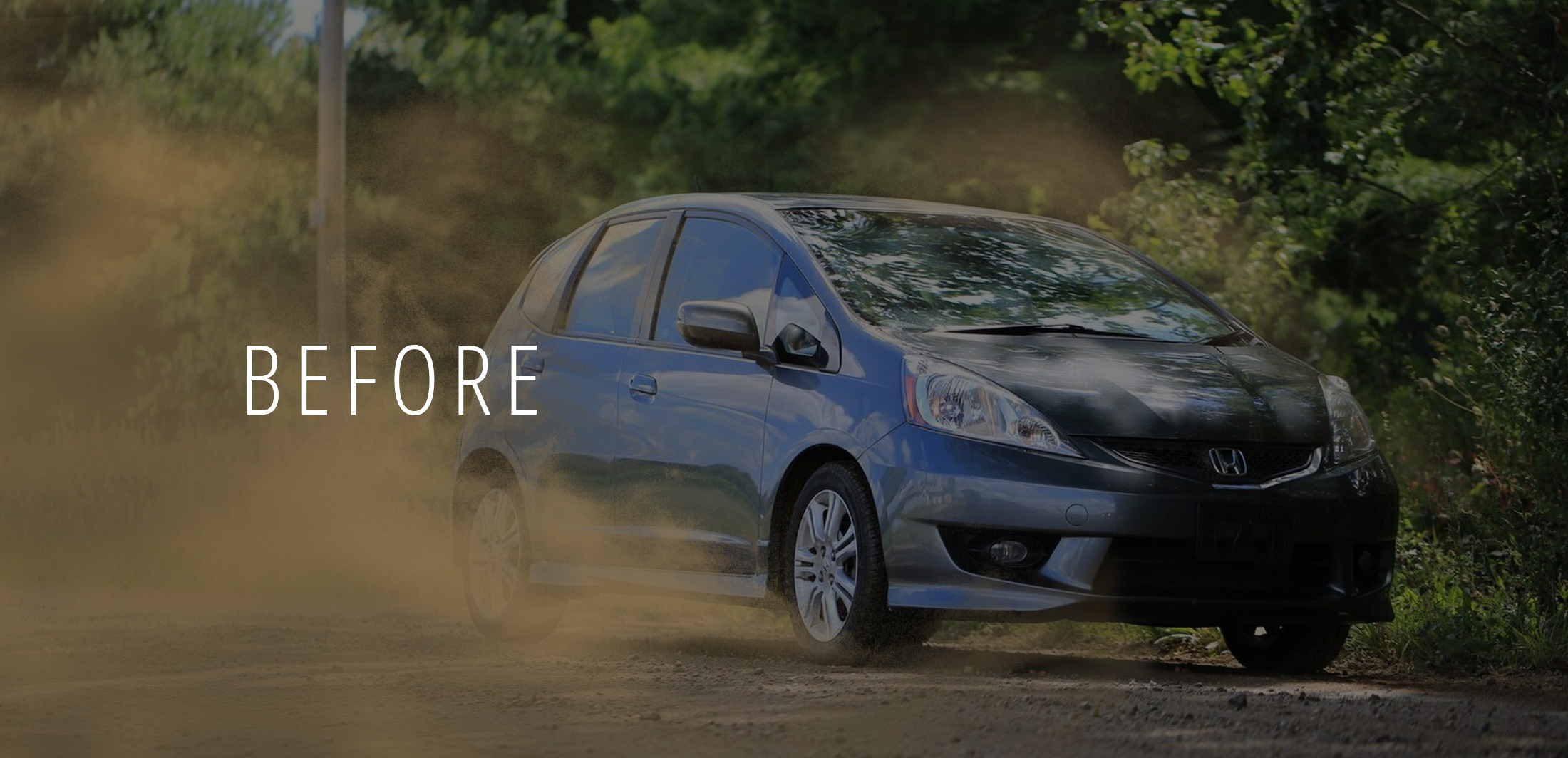

Oops! We could not locate your form.
ARE YOU READY TO TAKE CONTROL OF YOUR DUST PROBLEM?
Oops! We could not locate your form.



